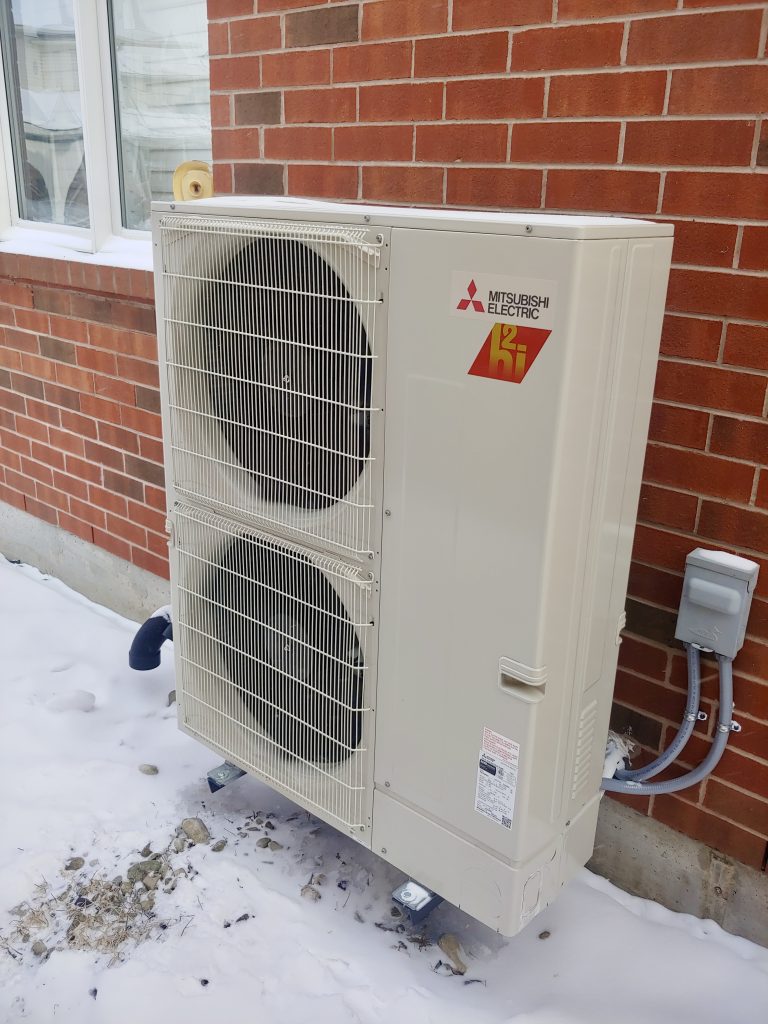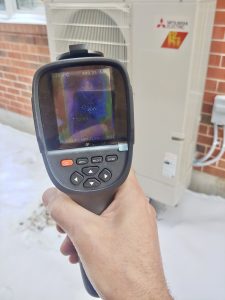My Heat Pump Journey in Canada’s Cold Climate: Thriving at -20°C
I’m a homeowner from Southwestern Ontario, Canada, about an hour west of Toronto. I live in a 280-square-metre (3,000-square-foot) suburban home that’s around 20 years old and reasonably well-insulated. Last October, I decided to take advantage of Canada’s Greener Homes Grant and rebate scheme to replace my natural gas furnace (see what a gas furnace is at the end of this article) with an air source heat pump. Here’s how it’s been going.
Why I Made the Switch
My old heating system was a 92% efficient natural gas furnace with an output of 29 kW (100,000 BTU). It was still working fine, but I wanted to reduce my carbon footprint and take advantage of the government incentives available for renewable heating. After some research, I settled on a Mitsubishi Zuba Central 12.3 kW (42,000 BTU) air source heat pump.

One thing that struck me was how much smaller the heat pump’s output is compared to the furnace it replaced. My heat loss calculation showed that my home needs 14 kW of heating on the coldest day of the year, so the heat pump is more than capable, even though it’s less than half the size of the old furnace. This made me realise how oversized most heating systems are, often installed to “play it safe” rather than optimise for efficiency.
The Installation Process
The installation cost around £10,800 (18,500 CAD), and I spent an additional £1,100 (2,000 CAD) upgrading my electrical panel to accommodate the 10 kW electric backup heater. The backup heater is there for extreme cold, but I’m happy to report that it only kicked in once all winter, and that was because my partner left the front door open for too long on a chilly February day.
Performance in Sub-Zero Temperatures
We had a particularly cold snap in January, with temperatures dropping to -20°C for a week. The heat pump handled it like a champ, keeping the house warm and comfortable without needing the backup heater. I was genuinely impressed by how well it performed in such extreme conditions.
In terms of efficiency, the heat pump has been a game-changer, especially during the milder “shoulder seasons” of spring and autumn. During these times, the system achieves a Coefficient of Performance (COP) of 3 to 3.5, meaning it’s much more efficient than the old gas furnace.
Energy Costs and Savings
From an energy use standpoint, the heat pump is far more efficient than the natural gas furnace it replaced. However, because of the relatively low cost of natural gas in Ontario compared to electricity, my energy bills for the 2023–2024 heating season were about the same as before. That said, I’m expecting better savings during the cooling season, as the heat pump is significantly more efficient than my old air conditioning unit.
Bonus Benefits: Cooling and Noise Levels
Speaking of cooling, the heat pump has been a revelation. It’s much quieter than my previous system. So quiet, in fact, that I can’t hear the outdoor unit running unless I’m standing right next to it. It also cools the house more effectively, thanks to its ability to run for longer periods at lower outputs. This makes a huge difference on very hot days.
Hot Water Heating
I also replaced my natural gas water heater with a Rheem ProTerra heat pump water heater, which has a 250-litre (65-gallon) capacity. It’s been fantastic at keeping up with demand for our household of four adults, and I haven’t noticed any difference in performance compared to the old gas unit. The only downside is the Rheem app, which is completely useless. To monitor energy usage, I’ve installed an Emporia Vue II energy monitor on the key circuits in my electrical panel.
The Bigger Picture
I’m one of the first in my neighbourhood to make the switch from natural gas to a heat pump. Out of roughly 400 detached homes, there are only two heat pumps so far (mine and one other). It’s been a positive experience overall, and I’m oddly looking forward to a colder winter this year to see how the system holds up and whether the backup heater truly needs to come on.
If you’re considering a heat pump but are worried about how it will perform in cold weather, I hope my experience shows that modern heat pumps are more than up to the task, even in sub-zero temperatures.
A Note for UK Readers: In Canada, most homes use forced-air heating systems (often called furnaces) rather than boilers. These systems heat air directly and distribute it through ductwork and vents, unlike UK boilers, which heat water and circulate it through radiators or underfloor heating. While the technology is different, the principles of switching to a heat pump are similar: both systems can be replaced with an air source heat pump to improve efficiency and reduce carbon emissions. The key takeaway is that heat pumps are highly effective even in cold climates, and their performance in Canadian winters should give UK homeowners confidence in their ability to handle milder British winters with ease.

Great article! It will certainly support the argument that the technology is up to the task and it can be poor installation practises that produce poor experiences.
I was impressed my 12Kw Samsung unit kept my building at 21C when we had a cold (mild for you) snap of -5C but this article boosts my confidence further 🙂
5 Bedroom House in Cambridgeshire, double glazing, 300mm loft insulation and cavity wall insulation
Design temperature 21C @ OAT -2C = 10.2Kw heat loss, deltaT = 8 degrees
Bivalent system containing:
12Kw Samsung High Temperature Quiet (Gen 6) heat pump
26Kw Grant Blue Flame Oil Boiler
4.1Kw Solar Panel Array
34Kwh GivEnergy Stackable Battery System
- 27 Forums
- 2,495 Topics
- 57.8 K Posts
- 235 Online
- 6,220 Members
Join Us!
Worth Watching
Latest Posts
-

RE: What determines the SOC of a battery?
@batpred - Two observations: 1: Since a USB to RS485 ...
By Transparent , 8 minutes ago
-
Struggling to get CoP above 3 with 6 kw Ecodan ASHP
I've been using this heatpump for two winters now and a...
By GoodbyeGas , 31 minutes ago
-

RE: Humidity, or lack thereof... is my heat pump making rooms drier?
That would make sense. I've found the effects are prett...
By Majordennisbloodnok , 41 minutes ago
-

RE: Testing new controls/monitoring for Midea Clone ASHP
@benson — as @tasos suggests, plotting multiple variabl...
By cathodeRay , 1 hour ago
-

@painter26 — as @jamespa says, it's for filling and re-...
By cathodeRay , 3 hours ago
-

RE: Oversized 10.5kW Grant Aerona Heat Pump on Microbore Pipes and Undersized Rads
@uknick TBH if I were taking the floor up ...
By JamesPa , 14 hours ago
-

RE: Getting ready for export with a BESS
I would have not got it if it was that tight
By Batpred , 15 hours ago
-

RE: Setback savings - fact or fiction?
I also need to correct something I said by mistake earl...
By cathodeRay , 15 hours ago
-

RE: Electricity price predictions
@judith Thanks for sharing, and nice to see how the ...
By Batpred , 16 hours ago
-
RE: Need help maximising COP of 3.5kW Valiant Aerotherm heat pump
@judith thanks Judith. Confirmation appreciated. The ...
By DavidB , 19 hours ago
-

RE: Recommended home battery inverters + regulatory matters - help requested
That makes sense. I thought better to comment in this t...
By Batpred , 19 hours ago
-
Bosch CS5800i 7kW replacing Greenstar Junior 28i
My heat pump journey began a couple of years ago when I...
By Slartibartfast , 19 hours ago
-

RE: How to control DHW with Honeywell EvoHome on Trianco ActiveAir 5 kW ASHP
The last photo is defrost for sure (or cooling, but pre...
By JamesPa , 21 hours ago
-

RE: Plug and play solar. Thoughts?
Essentially, this just needed legislation. In Germany t...
By Batpred , 21 hours ago
-
RE: A Smarter Smart Controller from Homely?
@toodles Intentional opening of any warranty “can of wo...
By Papahuhu , 22 hours ago
-
RE: Safety update; RCBOs supplying inverters or storage batteries
Thanks @transparent Thankyou for your advic...
By Bash , 24 hours ago
-
RE: Air source heat pump roll call – what heat pump brand and model do you have?
Forum Handle: Odd_LionManufacturer: SamsungModel: Samsu...
By Odd_Lion , 24 hours ago
-
RE: Configuring third party dongle for Ecodan local control
Well, it was mentioned before in the early pos...
By F1p , 2 days ago
-

RE: DIY solar upgrade - Considering adding more panels
I know this is a bit old, but it made me wonder what co...
By Batpred , 2 days ago
-

RE: New Vaillant aroTherm Plus in black - When will it come to the UK?
@majordennisbloodnok Daikin, take note! (In fact, I hav...
By Toodles , 2 days ago
-

RE: Midea ASHP – how to set weather compensation
@mk4 — good work! First, I agree, no evidence of cycl...
By cathodeRay , 2 days ago
-

RE: Solis inverters S6-EH1P: pros and cons and battery options
I don't know about Solis inverters. It isn't a featur...
By Transparent , 2 days ago
-
Daikin Altherma 3 H HT - Freeze Prevention Threshold
Hi. We have an Altherma 3 HT (18kW I think) which, now ...
By RICHARDF5033 , 2 days ago




